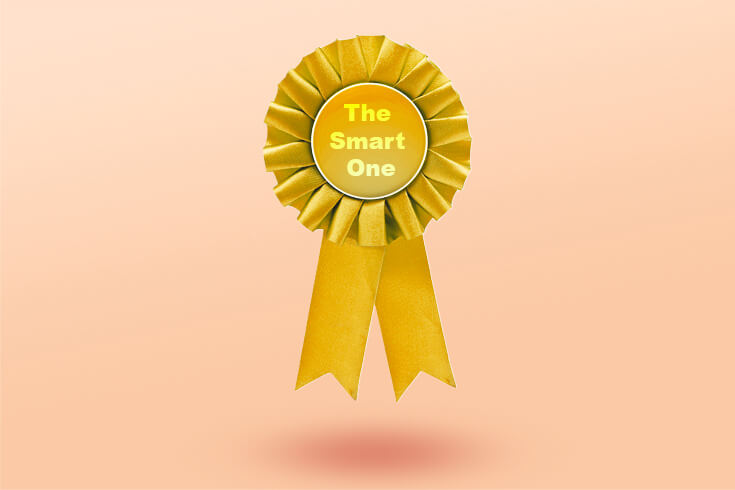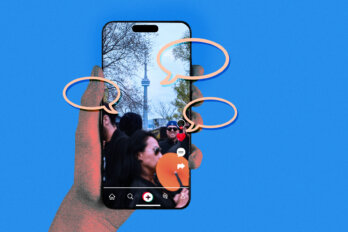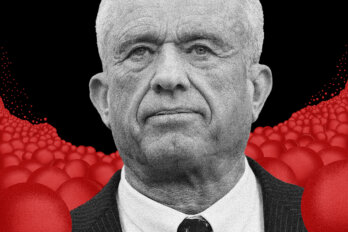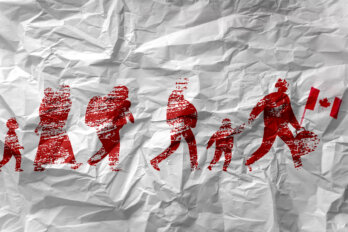In our culture, beauty still signifies worth, and its corollary, ugliness, is still seen as a deficit in character or punishment for some imagined sin. Disability is associated with villainy. Even Wonder Woman, supposedly a paean to female empowerment, had a villain whose only on-screen motivation seemed to be that she was disfigured and wore a mask—as though facial disfigurement was an adequate motivation for war crimes. From “thinspiration” to selfies, we are expected to curate our own images, to tell stories that showcase our own beauty, and to tell everybody how #blessed we all are in our bodies. For disabled people, this idea has historically been destructive. The idea of a perfect, beautiful body has been used as the justification for any number of terrible actions: “ugly laws,” which banned disabled or otherwise “undesirable” people from public spaces; forced sterilizations and other eugenicist policies; and the institutionalization of people with disabilities. Although things have improved—it’s no longer a given that disabled people will live lives shut away from the world—the underlying attitudes still exist.
Nevertheless, narratives about disabled beauty are increasingly finding a platform. As a disabled woman, I am seeing more and more avenues that allow people like me to showcase our beauty. Hashtags such as writer and journalist Keah Brown’s #DisabledAndCute and disability activist and sex educator Andrew Gurza’s #DisabledPeopleAreHot are joyous celebrations of the beauty and potential in disabled bodies. More and more clothing designers are making attractive clothing for people in wheelchairs. These clothes are cut to flatter seated frames and come complete with features, such as magnetic clasps instead of zippers, that make it easier for disabled people to get dressed. There are even makeup tools that are easier for disabled people and people with arthritis to use, which go a long way to alleviate the struggle to maintain “professional” standards for women in offices. (Whether makeup is a reasonable standard of professionalism in the first place is a question for another essay.)
I’ve happily bought adaptive clothing for myself. And I’ve been equally happy to see people sharing photos on social media using Brown’s and Gurza’s hashtags. But I haven’t yet participated by sharing any of my own selfies. For me, finding a way in which I can see myself as beautiful, cute, or hot is still fraught. It is something I both desperately desire and tend to reject out of hand—that is, when I don’t resent the discussion for taking place at all. In a world where disabled people are still denied access to much of public space and public life, it sometimes seems like enough of a struggle just to go about my life. Why should I have to be beautiful as well?
Why can’t I just be?
From the moment I was born, others have defined my body in terms of what was wrong with it. I didn’t move in the right ways, didn’t function in the right ways. Living with spastic cerebral palsy, a disability caused by brain damage at or near birth, means that, by definition, my body won’t do what it’s supposed to—the messages my brain sends to my arms, legs, and body become scrambled, interrupted. I have never been able to walk independently. Although I am not paralyzed, my movements are jerky, my limbs affected by frequent, painful muscle spasms. As I grow older, they are affected by more and more permanent contractures, which affect the shape of my body and make it move further away from what is normative.
My largely sedentary life means weight is a constant struggle. Not only do I contend with the standard Western diet-culture messages that say a woman’s worth is tied up in her ability to control her weight, but weight gain also carries a very real risk for me. I am justifiably afraid that, if I gain too much weight, I will lose the mobility I have and cause greater pain and stress to my already-weakened joints. All of which is to say that beauty is complicated for me and is becoming even more so as I age. I’m often bemused by accounts of aging written by women who are older than me. Often, they describe becoming socially invisible as they get older. I have always felt invisible, but it makes me wonder if there is an even greater level of invisibility waiting for me. There should be an upside to this—it seems to me that, if people do not see me, at least they shouldn’t hurt me. But my disability has not protected me from sexual harassment or assault—indeed, Statistics Canada reported in 2014 that both women and men with disabilities were almost twice as likely to be victims of violent crime.
Still, most strangers I meet are kind to me. Is that a function of some youthful beauty I will eventually lose? Will I receive contempt and cruelty when I go outside in my forties, fifties, and beyond? Already, people make an effort to look around me when I go out in public, and able-bodied people almost collide with me because it does not occur to them to get out of my way. But will this turn into outright hostility one day?
Like most little girls, adults told me I was beautiful, but I never believed them—or I did, but I thought this was the default praise they gave to little girls they liked. They may have said I was beautiful, but I believed they meant I was funny or kind or brave or hard-working. Even when they praised my physical attributes, like my eyes, hair, and smile, I believed they had to be lying, because I knew that girls in wheelchairs weren’t really beautiful—at least not if they weren’t also skinny or their disability wasn’t mild. Beauty was not a province I could enter. I knew this in the bone-deep way you know foundational facts about the world, like the days of the week or the order of the seasons. Even when I saw things about myself as beautiful, I could never maintain the belief for long.
Part of this is that, unfortunately for my self-esteem, I have been a deeply competitive person from earliest childhood. I couldn’t believe in body-positive messages about everyone being beautiful, and I knew I couldn’t win the beauty game. If I couldn’t be the most beautiful girl in the room, whatever beauty I did possess didn’t count. I needed a competition I had a chance of winning. So I did my best to earn praise I could believe in by becoming “the smart one.”
This was a role I could perform with ease. And it was definitely a performance: from toddlerhood, when relatives would get me to read hard words out loud for approval, through to high school, when I made an obnoxious show of how bored I was at all times. Then I ended up going to university in a small liberal-arts program with a lot of other awkward, gifted kids who had all been “the smart ones” at their respective schools. The competition got harder, but I could still distinguish myself. We debated philosophy with the deadly, painfully sweet earnestness only nineteen- and twenty-year-olds could pull off, dividing ourselves into Platonists and Aristotelians as though this said something not only about our intellectual interests but our moral characters.
It all suited me. If I could not compete in the realm of physical beauty, I could in the life of the mind. I could make a claim that my soul itself was beautiful and find elegance in a well-crafted argument or a movingly constructed simile. My teachers encouraged this, seeing worth beyond the failings of my body.
But my body—and, more troubling to me, my emotions as experienced through my body—continued to exist. It continued to have needs and take up space. It’s tempting to intellectualize everything, but it’s also unsustainable, even if able-bodied people find it more comfortable to relate to you on this level (or, conversely, to deny you have intelligence at all). Sometimes it seems as though I fight a war on two fronts—one with an ableist culture that doesn’t see me at all and another one with myself, struggling with my own desire to be seen. Of the two opponents, I am the more dangerous one.
The primary battleground where I fight this beauty war has always been my hair. As a disabled woman who needs help caring for her body, my hair has always been the subject of comment from caregivers who believed they had the right to it, a notion I have disabused them of since early childhood. For much of my adult life, it was long, thick, and curly: my one unequivocal success at performing femininity. It’s also, to put it mildly, a giant pain in the ass. You have beautiful hair, the women who cared for me would say, running their hands through it. You should cut it off and donate it to kids with cancer; it’s too hard for us to take care of.
I have, in fact, donated my hair to cancer patients, and I would gladly do so again. But the implication that I owed it to others, whether cancer patients or the personal-care attendants who didn’t want to take (and often didn’t have) the extra five minutes necessary to brush and braid it, is obnoxious. I found beauty standards painful to live up to, but it was more painful to have them taken away from me by others—creating a no-win situation.
As a queer woman who has had relationships with people of different genders, I once thought queerness could contain a refuge from all of this. Yet the question of my own sexual identity and preference has always been secondary in the eyes of the world. The world seems more likely to focus on whether an able-bodied person would find me sexually desirable—as though this magically transmits some able-bodied worth to me. Even among queer people, I haven’t seen many images that might one day reflect me. I lack the physical strength of the butch women I admire and do not have the time, energy, or means necessary to present the polished femininity queer femmes maintain. Nor could I find myself in the deliberate, careful androgyny cultivated by so many of my younger Gen Z queer siblings.
Even if I wanted to destroy the gender binary, or just reject it for myself, my physical body is very firmly on one side of it. Trying to present in a more masculine or androgynous way, I thought, would just be yet another painful arena in which it failed. I am already too often desexed by others. I’m seen as not a sexual being or even a woman at all; denying my feminine identity would feel to me like voluntarily giving up ground for which I’ve fought. As a result, I feel like I can’t express my own sexuality or make sense of how I want to present myself. I don’t seem to fit into the options available to me. It makes me feel more alienated than ever.
I know that nondisabled women also face real struggles when it comes to disentangling health concerns from beauty standards and disentangling their own sexualities from the culture at large, as, I’m sure, do men. But it is disabled women alone who get pressure from both ends, both to meet beauty standards (although not necessarily to be beautiful in ourselves but to look less disabled) and to not take time investing in our own appearances (because, in my experience, to do so presumably taxes the resources of others and is seen as selfish).
If a beautiful woman is a woman who controls herself—her weight, her desire, her appearance—in order to be attractive, a disabled woman loses that game from the start. Her only winning move, it seems, is to allow her body to be controlled by others. Consider again the added pressure to maintain our weight specifically so as to be easily cared for by others. I have been told by physical therapists, nurses, and even loved ones that I should maintain my weight, not only for my health, but so my body could be more easily lifted and moved. The assumption seems to be that, since my body failed at being an object of desire and lacked the ability to take up the physical demands of the traditional female role of caregiving, the least it could do is not take up space or make demands of its own. In exchange for participating in public life, it seems I must always remember that my body is a physical burden to others.
I hate rigged games. Parts of me would like nothing more than never to have to care about this again. Yet I can’t get this able-bodied perspective out of my head—not entirely. The complicated thing here is that this perspective is not entirely wrong. My body can cause difficulties for others, and caring for it does take resources and time. Sometimes, investing in my own physical beauty can feel like reclaiming control of my body. As well, I don’t want to throw out all questions of beauty or desire or utility as they pertain to me. As I’ve grown older, I’ve come to realize the idea that someone has to be either “the smart one” or “the pretty one” is also toxic and harmful. And, although I don’t want to play games I can’t win, I really don’t want to believe in the ableist perception of myself as a brain in a box—someone whose body doesn’t matter because my mind makes my existence worth something.
In high school, I wrote an extremely overwrought poem about how I have the right hands to be a pianist. I talked about how beautiful my hands are, how they had the right form to make beautiful music, and then how tragic it was that I would never be able to use them to play piano. It was not a good poem, but I’m still interested in the questions it asks—What use is form without function, or function without form? Can someone be beautiful if they’re not useful, or useful if not beautiful? And why do I crave those externally imposed judgements anyway?
I don’t have an answer, or even a preferred solution, for any of this. Mostly, I want to choose for myself what to value and when, especially when it comes to questions of love and desire. I have found partners who said they found me beautiful, as I found them. As well, there are things I like about my body (and my mind) and would like to celebrate, regardless of whether any potential partner agrees. I like my unmusical hands and my annoying hair. But the interaction of beauty and ability will always be fraught, and there will always be a tension between celebrating beauty and being caught in its trap. Claiming my own beauty, or even my intelligence, can be inclusive and empowering, but I would like to be able to do it without feeling like I’m justifying my own continued existence for an audience—like I’m “making up for” my disability somehow. I would like to believe for myself something that I never hesitate to tell others: I have nothing to make up for.




